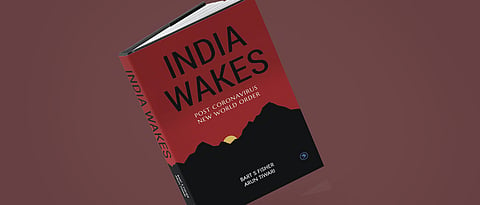

The world is going through a transformative phase. Many peculiar things are happening, triggered by the strange coronavirus, in the world political and economic system which are out of the box and one even wonders if there is any box. The United States, boasted as the model of the best in everything humankind has ever had, has turned out to be a helpless country, struggling to manage a pandemic with all its scientific might and leadership that considers a tamasha like ‘Namaste Trump’ as its glorious moment.
‘India Wakes’ is a good book in the way it is written. Its value lies in its timelines and straight talk. First of all, it is rare to see an American co-authoring a book with an Indian author and vice versa because the egos of both sides operate big-ticket. Writers in both countries are of the ‘I know all’ type. Here, we find two authors, senior citizens, established scholars, well-versed with the ways of the world and writing in a sagacious way, not argumentative or sensational but presenting facts as they are. The book leaves readers curious and motivated to conclude rather than peddling opinions.
Everyone in India knows that our leaders at the time of Indian independence created a big human tragedy by agreeing to a partition that not only created unparalleled human misery for millions of ordinary people but also created a permanent enemy of India. The title of the first chapter of the book, ‘Botched Up Independence’ is finally a truth that everyone knows but hesitates to tell. The fact that Indian independence was anyway coming with the mention of the Atlantic Charter episode is a fresh perspective to many readers of my generation.
‘India Wakes’ also has a different style of writing. Rather than professing from an ideological pedestal, it gleans from the articles and opinions on the internet and presents some real gems from not so established authors and commentators, telling the truth as they see it with their unbiased stance. We would call it the most democratic book that has been published in many years. It mirrors the modern world as it is – messy, hazy and unpredictable.
The book also states plainly the high jacking of states by powerful, macho leaders like Putin in Russia, Trump in the US, and Xi Jinping in China besides leaders in Brazil, Turkey and so many other places. Though the book does not call Mr Modi, a macho leader, it includes India in the trend. Indians remember well Mr Modi’s boast of chhapan inch ka seena (56-inch chest line), and it is very easy to read between the lines.
The book is a little lengthy, expansive and at places gets uninteresting, for example, while giving the details of who fathered the WTO, who mothered the replacement of gold with the dollar in international currency management, and so many Laws and Acts of the US system.
To Indians, this drama of democracy is passé and not of much interest. However, some chapters we particularly liked are the ones on the Internet World and the Freedom of the Seas. Actually, it is here that the secret of future power lies. China has made some really good progress and both India and the US will do a great service to the people of the world to get rid of their egos and join hands to stop China who does not even pretend to be a peace-loving country anymore.
Excerpt from the book: "The world into which India wakes is a nightmare decimated by a global recession, caused by the coronavirus pandemic originating in China and engulfing most of the world. The country of 1.3 billion people warded off any community level transmission most resolutely. Was the coronavirus pandemic a Black Swan type rare event turned into an opportunity to dominate the world by China? Would the trust deficit heightened by China’s ambushing Indian soldiers become a snowball or disperse off like the clouds? Has the 5-trillion-dollar Indian economy dream become a mirage already? What all would fall into the fault line of socio-economic inequality?
Will there be a new Cold War between the United States and China, and if there is one, how can India avoid becoming collateral damage? Is it possible that the United States, India, and China build a new world order based on mutual needs and interests, or is a hegemon power already on the prowl? Anchored in hope, rather than adding to anxiety, and seeing present times as a teachable moment of human history, the book recalls the past and contextualizes it for the next politico-economic shift that is currently unfolding in the world. Every nation must find its bearing and position itself in the matrix of a de-globalized world."
India Wakes: Post Coronavirus New World Order
Authors: Bart S Fisher and Arun Tiwari
Publishers: Sakal Media Pvt. Ltd.
Available on Amazon
Edited by Suvajit Mustafi
